- Home
- Mark Lawrence
Neverland's Library: Fantasy Anthology Page 25
Neverland's Library: Fantasy Anthology Read online
Page 25
“Exactly. But how magical is a dragon with a GPS transmitter on its leg and a CCTV camera in its lair? Real magic is mysterious. It's hidden. It's not labeled on a map, and it doesn't have technical specifications in a downloadable PDF file.”
“But it does kill sheep, apparently.”
Alzbeta shrugged. “A small number of sheep, for which full compensation is paid.”
“And the dragons get the blame.” I remembered Jozef's anger. “That farmer talked about shooting them.”
She smiled. “Oh, it's all a big show to make sure they get their money. I bet you thought he was hard done by, huh? It's what they want us to think! But the compensation is actually more than the market value of those sheep. That's why—” She stopped mid-sentence, and instead concluded, “That's why you don't need to worry about the dragons.”
I sighed and leaned back in my chair, wondering what she'd nearly said.
“Magic must have its secrets,” she said firmly. “Without secrets, it isn't magic.”
“But we live in an open society—a democracy. To reintroduce dragons, we had to educate politicians and voters, and get them on board. That's how it's supposed to work. We can't just secretly reintroduce anything on a whim, not without some kind of scrutiny. Not without licensing and all that.” The idea of mysterious magic sounded alluring in principle, but rather more alarming as a bloodthirsty monster roaming the countryside.
She laughed. “Democracy? This is magic! You can't take a vote on transcendence. You can't flip-flop every five years over whether the world is mysterious or not.”
“I take your point,” I said—not because I agreed with it, but because I wanted the conversation to end.
Alzbeta clearly wouldn't come out and tell me what had really killed those sheep. Not until I'd been promoted within the organization—whatever that involved. Was it just a matter of paperwork and job titles, or was it something rather more visceral?
And if I confronted her with my suspicion, forcing her to respond, then would she simply nod and say, “Oh, how clever of you to guess?” Or would she take steps to preserve the secrecy that “real magic” depended upon? I imagined another version of the compensation form—instead of “Sheep: €100”, it might read “Human: €1,000,000”. The Phoenix Foundation surely had insurance policies to cover all sorts of accidents, dragon-related and otherwise.
Alzbeta paid for the meal. She thanked me for all my efforts over the past three months, and she promised me a good reference for any job applications. “I admire your scruples,” she said. “That's what the Foundation needs: people who ask questions and care about the issues.”
When I saw her drive away, my whole body sagged with the release of accumulated tension. I found a bench in the market square, and sat down to think. Pigeons swiftly approached on the off-chance of food, reminding me of the griffins in the yard; it made me nostalgic already.
I sympathized with Alzbeta. I understood her point about magic needing an elusive, esoteric side—the antithesis of today's form-filling bureaucratic culture. And I appreciated her efforts to arrange compensation for those affected.
But on the other hand…the arrogance! I shivered, recalling how she'd laughed at the notion of democracy. It's fashionable to denigrate politics: she probably thought she was on safe ground by sneering at it.
“Yet what's the alternative?” I asked myself. “Trusting in a secret, self-appointed cabal? That only sounds attractive when you're part of it.”
Did I want to be part of it? I was tempted. I remembered the exhilaration of standing on the slopes of the High Tatras, surrounded by dryads and dragons, thinking of the beauty I'd helped restore to a gray, faded world. It would surely feel even more intoxicating to know all the secrets of the magic around me, to be responsible for the world's mysteries….
But Alzbeta had made it clear that becoming an insider would take years. And I hardly had a guarantee—she could simply have been fobbing me off, using an empty promise to keep me quiet. How could I trust her? How could I tell if Alzbeta was on the right side?
In the end, you can only judge people on what you know they've done. And the only thing I really knew about Alzbeta was that she'd lied.
I needed to learn more. I needed to stay with the Phoenix Foundation, and see what was happening around the world. Alzbeta's cabal might be the benign guardians of the world's secret magic. Or they might not—in which case, I needed to protect myself.
Looking around the square, I saw a jewelery shop. I walked inside, and I asked what they had in silver.
Charlotte and the Demon Who Swam Through the Grass
Mercedes M. Yardley
THERE ARE STORIES, and there are tales. And then there are fairytales, which are the most exquisite and precious of all. This is the fairytale of Charlotte, and the story of how she came to be.
Once upon a time, in a land that really wasn’t so very far away, there was a little girl named Charlotte. Lotte was a sweet thing. An adventurous thing. A brave thing and a charming thing and all of this rolled into one small child, a girl with pigtails and wide eyes and a grand, exciting future.
But of course Lotte didn’t know any of this yet.
She would wake up in the morning and rub her eyes. Get dressed into patchwork and sit almost still while her mother would tie her hair up in ribbons. Bolt a breakfast of toast and marmalade, and then scream out of the house and down the hill, into the meadow with her friends. And she would play. How she would play! She was a knight. She was a princess who rescued herself. She had tea parties and grand executions. Pretended she was the fiercest of dragons. Pretended she was visiting another planet. Pretended she owned the other planet. She shared all of this with her friends.
There was a beautiful boy with holes in his hands and the most glorious of white wings. A girl who used to be invisible, she said, but her bracelet of stars made her glow with light. A tiny star that chirped and whirred and snuggled, but mostly liked to ride inside of Lotte’s pocket and peep out. Monsters. Demons. These were her friends.
“The Boy Who Hangs the Stars was terribly sad today,” Lotte told her mother at lunch. She scarfed down her grilled cheese sandwich and tomato soup. Her hair had fallen out of its ribbons and her knee was scraped. She was exactly everything a little girl should be.
“Why was he sad?” Her mother tried to keep a neutral expression, a friendly expression, but it was getting more and more difficult as the days went on. “The demon tried to drag me into the pond, but I got away,” Lotte had told her the week before. She had tears in her clothing and scratches on her skin. “He’s getting stronger.”
“He’s sad because the Invisible Girl has to go away for a while. She promised she’ll come back, but he’s afraid she won’t.” She leaned closer to her mother. “He loves her, you know?”
“Does he?”
Lotte nodded.
“Yep. She loves him, too, but she still has to go away. I think it might have something to do with the demons. The one that swims through the grass is getting scarier.”
Charlotte’s mother sat down at the table. Her fingers played with each other in a strange way, a way that said she was Worried, or Concerned, or the other words that her mom used sometimes when she talked in a low voice on the phone while discussing Charlotte.
“Lotte, sweetie, you know that this is all just pretend, right? These friends are somebody you made up. Friends from your imagination. They aren’t real. Not the starry boy, or the invisible girl, or anybody else. Especially not the demon who swims through the grass.”
Lotte drank her milk and wiped her lips with the back of her hand.
“Oh, don’t say that, Mommy! It will hear you, and then it will get mad. It says it will do all sorts of things if it gets mad.”
Her mother paled. “What sort of things, darling?”
“Bad things. Mean things. It doesn’t want me to say.”
“I don’t want you pretending about the demon anymore.”
“But
Mommy—”
“Charlotte, stop!”
Of course her mother didn’t understand. How could she? It had been so long since she had been a child herself. She, too, had worn pigtails and discussed life and dreams and fascinations with her own “imaginary” friends, but years had ground down the gears of her memory. Adults want to remember, they truly do, but some things just aren’t possible after one reaches A Certain Age.
“I’ll stop, Mommy.”
“That’s my good girl.”
Demons don’t care for good girls. They want scared little girls. Terrified little girls. Girls who run from them and have dreadful dreams. The demon who swims through the grass was angry at Charlotte for ignoring it, and especially angry at Charlotte’s mother for disbelieving. It whispered its plans. It threatened. It promised to do the most poisonous of things to those who lived inside the house.
“I can’t talk to you anymore,” Lotte said. “I’m sorry. Mommy will get mad at me.”
The demon would get angry, too, it hissed. Charlotte had better do what it says. The other friends, the boy and the star and a little ghost girl, pressed against Lotte, trying to keep her safe with the warmth of their bodies.
“Be careful,” the Boy Who Hangs the Stars said. He took Lotte’s hand in his own. His hands were soft and warm and the holes in his palms didn’t bother Lotte at all. “The demon is getting more powerful. I’m afraid for you.”
“I’ll be okay,” little Lotte reassured him, and smiled. He smiled back, and held her hand tighter, and everything seemed like it would be all right for a minute.
But it wouldn’t. It wouldn’t.
That was the night the demon set Charlotte’s house on fire. Everything changed.
#
Charlotte had heard the saying several times. “You can’t go home again.” She was terrified to find out if it was really true.
“This your stop?” The bus driver asked her.
“Yes. Thank you.”
“Somebody gonna to meet you?”
“I’ll find out.”
Indeed, somebody was there to meet our Charlotte, who went by Charlotte now. “Lotte” was a name for little girls in their frothy dresses, secure in the love of their family, their heads full of dreams.
Troubled women with cloudy pasts preferred to be called “Charlotte”.
Charlotte brought one bag with her. It held everything she owned. She had grown quite adept at packing over the years, our poor girl. Moving from place to place. Escaping one situation for another. It is fair to say that Charlotte experienced very little magic.
But, as stated, somebody was there to pick her up. A woman she didn’t know.
“Are you here to take me home?”
The woman sniffed at her.
“I’m here to take you to the house, yes.”
The words were unmistakable. The house. Not her home. It will never be her home. Charlotte will never be welcomed back.
The ride was silent. Uncomfortable. The woman kept stealing glances at Charlotte, and Charlotte watched the road be devoured by the hungry wheels of the car.
“So much has changed,” she said.
The woman didn’t answer back.
The house came into sight. It had been rebuilt after the fire and was shaped strangely to Charlotte’s mind. Rooms where there shouldn’t be rooms. Spaces where there shouldn’t be spaces.
“Looking at your handiwork, eh, firebug?” the woman said loudly.
“I didn’t cause the fire.”
“Sure you didn’t. Maybe a pixie did it instead?”
“Stop it.”
“Or faeries. You know how they are. So full of mischief. Wearing their little bluebell hats.”
“I don’t want to hear anymore!”
“Where were your friends then, huh? When the house went up in flames? When your mother was screaming with clothes and hair and hands on fire? She carried those burns until the day she died, afraid to leave the house because of the way she looked. She was nothing but stiffness and pain. But you? Found on the lawn in your pajamas, skin perfect as a peach. Not burnt at all, fancy that.”
“Let me out of the car.”
The woman ignored her. The house loomed, looking more and more sinister. Accusing. Charlotte’s eyes filled with tears. She blinked angrily and one ran down her cheek.
“Oh, no you don’t,” the woman said, and her voice shook. “You don’t get to cry. While you went to some fancy hospital for your delusions, I took care of your mother. She missed you, even after all that. I couldn’t tell you why.”
“I was j-just a little girl.”
They were here. The woman slammed the car into park so quickly that Charlotte’s seatbelt caught.
“Being young had nothing to do with it. Evil is evil. It starts at the root. And you’re the worst of it.”
Charlotte opened the car. Grabbed her bag. Cleared her throat before she asked because she was afraid her voice would sound weak, would sound afraid.
“Can you tell me exactly where my mother is buried?”
The woman’s face went ugly. Changed into something horrible and voracious and mean. Charlotte nearly reached for the bottle of pills in her bag, but the woman’s face calmed, returned to normal. It was anger, not delusion. Hatred that did this, not Charlotte’s neurons firing in broken ways.
“At the cemetery near the bottom of the hill. Left side.”
She reached over, slammed Charlotte’s car door shut, and skidded out of the driveway, throwing gravel around her.
“Glad you’re back,” the Boy Who Hangs the Stars said. He put his broken hand on Charlotte’s shoulder, and his large white wings fluttered.
“Great. I’m home for thirty seconds and I’ve already gone crazy.”
This time she grabbed a bottle of pills from her bag. Shook two out and swallowed them dry. Took a deep breath and fit her key into the door of the house. Stepped inside.
The boy with wings watched her go.
#
Charlotte’s room suffered little damage in the fire. Her mother, who still loved her little girl despite everything, had left the room exactly the same as it had been when Charlotte had left. “Left” wasn’t exactly the word that Charlotte would have used. “When she was dragged kicking and screaming away from her mommy and into a hospital with tests and strangers and medicine in plastic cups and needles” is what Charlotte would have said, but of course, nobody asked her. So her mother simply chose to believe that her Lotte had left.
The room had blue walls with rainbows painted in the corner. It was full of dolls and board games and all of the things that makes a little girl happy.
Except her mother. Her mother wouldn’t ever sit on the bed again. Wouldn’t ever kiss Charlotte’s cheek after tucking her in. She had seen her mother twice in the fifteen years since the fire. Two times. That was all. The hospital didn’t want her to come, lest it interfere with Charlotte’s treatment. And her mother wasn’t physically well enough to make the trip to the other side of the country.
“Because of the fire, you know,” a voice said next to her elbow. “Because of the tremendous pain she was in.”
The voice came from a little shadow with white eyes and sharp teeth that stretched all the way around his face like a zipper. He started poking through Charlotte’s bag. Pulling out a thin hoodie. Pulling out a threadbare pair of shorts and pitching everything to the floor.
“You’re not real,” Charlotte told him, and then squeezed her eyes shut. Don’t acknowledge the illusions. Don’t give them any credence. Talk to them as if they’re real and they might as well be.
“Good to have you back, by the way,” the shadow said. His voice was dark and made of wind. “It was lonely here without you. Nobody to play with. Do you remember how we used to play?”
Charlotte closed her eyes, breathed through her nose. Thought calming thoughts. Repeated her mantra. Prayed to a god. Did all of the things that a woman who is on the edge of sanity does. When she opened her e
yes, the shadowy creature was no longer there.
“Thank goodness!” Charlotte said, and fell onto her bed. She frowned. Felt something under the covers. She reached in, fished around, and came out with something sweet and tiny and very soft. A doll, with dark hair and blue eyes. She remembered it. A tiny Lotte doll. The doll of her, made with love by the invisible girl when Charlotte was only a few years old.
“I…thought this wasn’t real,” she said.
There was a snicker of laughter behind her.
#
Charlotte hid. That was the only word for it, poor dear. She holed up in her house, refusing to step outside, refusing to speak to the enchanted horde that deigned speak to her. She didn’t want to face the town who blamed her for the fire. Neighbors who wondered if crazy was contagious.
She didn’t want to stand by her mother’s grave alone. That thought was too much for her.
“You won’t be alone,” said the invisible girl with the star bracelet. Her smile was soft and sincere, and Charlotte couldn’t help but smile back, vision or no vision. “We’ll be here with you. We loved your mother, too, you know.”
Charlotte automatically looked for her bottle of pills, but the girl took her hand.
“You don’t need medicine. You never did. We’re real, Lotte. We always were.”
Charlotte signed.
“I almost wish that were true.”
The girl’s smile grew even sunnier.
“It is true. Doesn’t that make you happy?”
“It makes me crazy.”
The invisible girl held Charlotte’s hand tighter. Kissed her cheek. Dropped her hand and stood up.
“Are you the kind of daughter who starts her own house on fire? Who calmly walks outside and lets her mother burn?”
Charlotte was taken aback.
“What a terrible thing to say!” she said. Her chest hurt. Her eyes stung. She thought of her mother with her hair ablaze and feared she would vomit.
The glowing invisible girl watched her carefully.
“Of course not. You couldn’t do it. You wouldn’t dream of doing it, and it doesn’t matter what the doctors say. But if you didn’t, who did?”

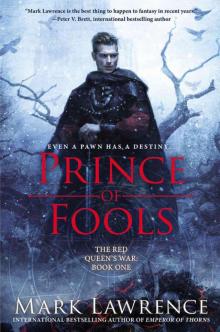 Prince of Fools
Prince of Fools Vodka Politics: Alcohol, Autocracy, and the Secret History of the Russian State
Vodka Politics: Alcohol, Autocracy, and the Secret History of the Russian State Holy Sister
Holy Sister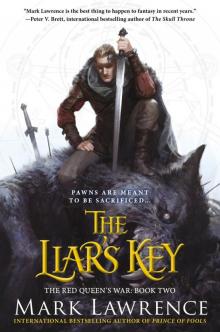 The Liar's Key
The Liar's Key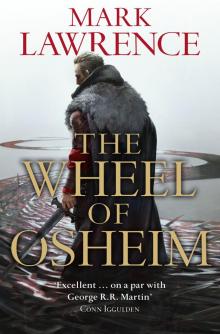 The Wheel of Osheim
The Wheel of Osheim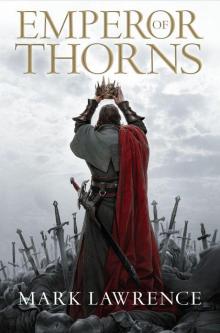 Emperor of Thorns
Emperor of Thorns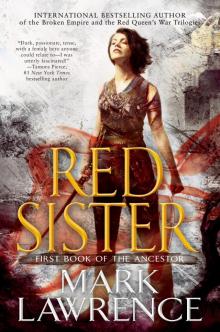 Red Sister
Red Sister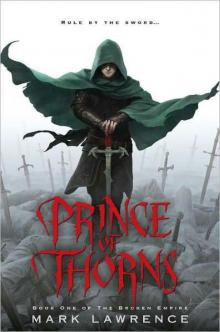 Prince of Thorns
Prince of Thorns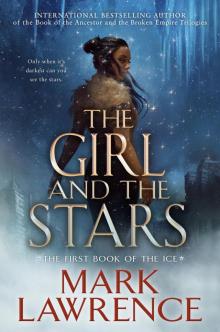 The Girl and the Stars
The Girl and the Stars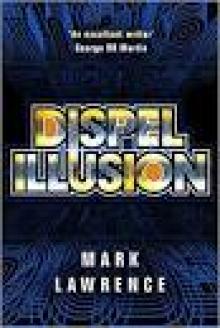 Dispel Illusion (Impossible Times)
Dispel Illusion (Impossible Times)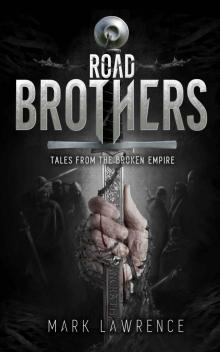 Road Brothers
Road Brothers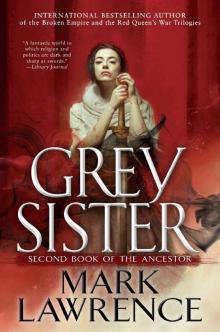 Grey Sister
Grey Sister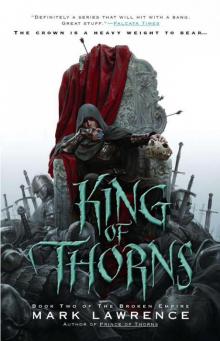 King of Thorns
King of Thorns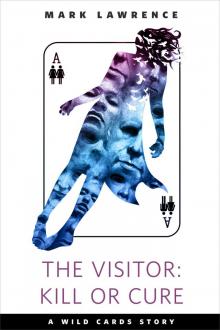 The Visitor--Kill or Cure--A Tor.com Original
The Visitor--Kill or Cure--A Tor.com Original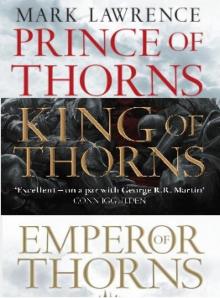 The Broken Empire Trilogy Omnibus
The Broken Empire Trilogy Omnibus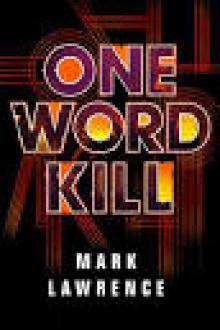 One Word Kill (Impossible Times Book 1)
One Word Kill (Impossible Times Book 1)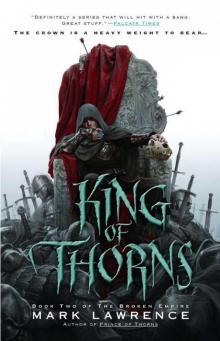 King of Thorns be-2
King of Thorns be-2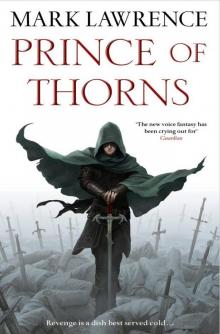 Prince of Thorns tbe-1
Prince of Thorns tbe-1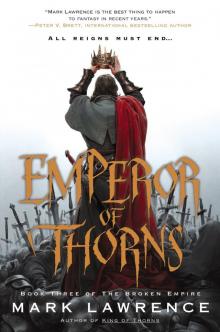 Emperor of Thorns tbe-3
Emperor of Thorns tbe-3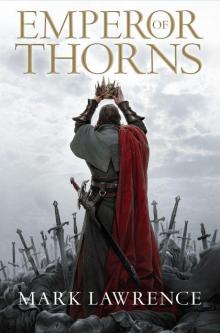 Emperor of Thorns (The Broken Empire, Book 3)
Emperor of Thorns (The Broken Empire, Book 3)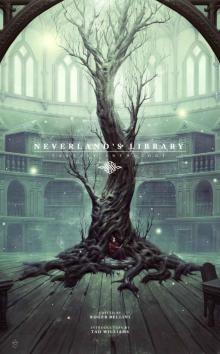 Neverland's Library: Fantasy Anthology
Neverland's Library: Fantasy Anthology